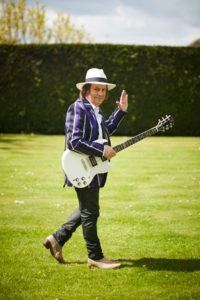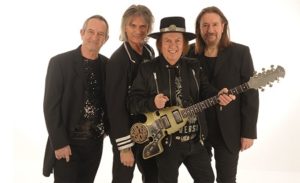A chat with the legendary Dave Hill, guitarist with Black Country icons Slade.
There’s nothing much that can be said about Dave Hill, or Slade, that hasn’t been said many times before. The sort of chart success that only a handful of bands could ever emulate, a reputation as one of the hardest-hitting live acts of all time and THAT song. When you get the opportunity to talk to someone with such a pedigree, you make sure the tape’s running and you’ve got fresh batteries.
To state the obvious, Christmas seems to come round faster every year, and it would take more than a global pandemic to keep Slade off the road in December.
“It’s coming quite fast this year. The plan is to put optimism into the market place and start the idea that there could be a possibility of seeing some live music, and of course, us being the band we are, and having made certain records, we would be an option to get people out of the house and into a theatre or whatever.”
You’re getting on a bit and there’s all that trouble outside. Shouldn’t you be taking things a bit easier by now?
“That’s probably what I have been doing. After one or two months taking it easy isn’t an option. I’ve been utilising my  time wisely, along with a spade and various things in the garden. When you’re ever frustrated dig a hole, then you end up with a bad back but in the meantime I’ve been quite productive on the writing front, because of this time and not being able to go out before.
time wisely, along with a spade and various things in the garden. When you’re ever frustrated dig a hole, then you end up with a bad back but in the meantime I’ve been quite productive on the writing front, because of this time and not being able to go out before.
“It was definitely ‘You won’t go out dad,’ so I’ve concentrated on writing and it’s been quite fruitful because I want to do something myself. It won’t be a new solo album, it’ll be the guitarist from Slade doing something different.
“I’ve got involved in what you might call a creative bubble which has helped because it’s not easy for a performer, someone like me who’s been doing it for fifty years, to suddenly be out of work and told you can’t play there or do that, and this year particularly was going to be my best year work-wise.
“Everybody wants to keep the work but move it to next year; if anything does go wrong there’s always next year but the idea from the promoter and everyone involved is to get everything motivated. It’s things like I hadn’t been doing interviews for several months so today and yesterday it’s been full of them. It was making connections with people again.
“It’s quite a nice feeling and we don’t know how what we’re dealing with is going to pan out but rather than looking at it grimly I do miss the live shows. Retirement? I couldn’t spell the word so to be honest that was never an option, of course there will come a time when I know I’ll want to come out of it but at the moment I’m like an old vaudeville entertainer. I might drop dead on stage.”
The Slade line-up has changed a lot since the classic days and now Russell Keefe is singing and playing keyboards.
“Russell is a talented keyboard and piano player who brings a nice clarity to the band. I play all the guitar work and he’s a nice blend underneath that but when he’s featured on piano on such songs as Everyday or My Oh My, they sound more authentic, like they do on the records.”
Your setlist has been a bit more adventurous for the past couple of years and you’re playing lesser-known songs such as those two, plus How Does It Feel and My Friend Stan – and it says everything about how massive Slade were, when records which got to number two or three can be called ‘lesser-known’.
“Noel Gallagher came up to me a few years ago at Heathrow. He said how much of a huge fan he was and he loved How Does It Feel, because of Nod’s lyrics. It never dates, it always points to the future. We chatted, I took his number and asked him to give me a quote for my life story, So Here It Is, and he said ‘No Slade, No Oasis’. That was a good thing of him to say.”
Whatever else they might get up to, the Gallagher brothers have always acknowledged their influences. A lot of musicians might not do that, but it’s always good when it happens.
“I certainly do. With me it was Elvis at first, then I took up the guitar, bought myself a Burns. The early guitars we  had were dreadful. You bought them out of the catalogue, they had bad acoustics, the strings were awful – try to push them down and they’d hurt your fingers but of course that was part of the learning curve. It doesn’t matter how bad the guitar is, if you have a will there’s a way, and for me it was a guiding light because I was well bored when I was a young kid. The neighbours had an acoustic and I didn’t understand what it was.
had were dreadful. You bought them out of the catalogue, they had bad acoustics, the strings were awful – try to push them down and they’d hurt your fingers but of course that was part of the learning curve. It doesn’t matter how bad the guitar is, if you have a will there’s a way, and for me it was a guiding light because I was well bored when I was a young kid. The neighbours had an acoustic and I didn’t understand what it was.
“It seemed alien but it spoke to me, I was only twelve or thirteen then I had this guitar out of Kay’s catalogue. Ten pounds fifty, arrived in a cardboard box, I get it out and I’m left-handed so that wasn’t going to work, the teacher I went to said I had to get used to playing right-handed and it’s worked out well for me.”
We mentioned How Does It Feel and Everyday. Far Far Away as well – if those three had been written by Lennon & McCartney they would be regarded as all-time classics and be played on every radio station in the world.
“I think Paul would probably agree with you. He knew quite a bit about us, and he’d agree on the quality of the lyrics. Nod’s lyrics on that were exceptional. It wasn’t one of our biggest hits but we stick it in the act and sometimes you pick on something like that and you see how well it goes. We’ve got two singers now – Russell does the more gritty stuff and John Barry the bass player does the ballads. He’s a good singer, he’s a good guy and that’s the main thing.”
On drums you now have Alex Bines.
“He’s very solid, versatile, loud, which is good for me. Alex is a really nice guy to be around, there’s a really nice atmosphere now. I’m hoping to meet up with them in some sort of rehearsal situation in the next week or two just to whack out the act, loosen your collar. They love it and they miss it. Russell and Alex are new to working with me but they’re good to be around. It’s important to have people that are, especially when you’re my age you don’t want hassle, you don’t want problems with strangers.
“Sometimes when I first reformed the band you got people coming in, although they’re quite good they tend to be the types who’ve read guitar magazines and think this is the way things happen, which isn’t true. So they come into a name act and they think they’re rock stars, which can be awkward. We had some problems at first, but eventually these people don’t stay. John knows the score, he understands what it’s like.
“Being in a band is unique – some people might wonder how you can put up with the travelling, getting into vans and driving round. I thought, when I was eighteen that was how I started and I couldn’t see any reason why I’d want to change it. Admittedly we fly now but when you get on stage and do the show it might have taken you more than a day to get there and back but it’s very rewarding to go somewhere new and play to a new audience that know the music as well as anyone else does.”
On the December tour you’re playing the Asylum in Birmingham, which is a new venue for you.

“No, I’ve not played there before. I don’t know it. We played the 02 Institute before but these rock clubs are ideal for me. A lot of the gigs in Germany are on a similar kind of circuit. I don’t always play the clubs, we can play festivals with bands like Andy Scott’s Sweet and Smokie with Terry Uttley, one or two original members in the bands and they do very good business. People don’t realise the size of the audiences I play to.”
You’ll not have a chance to nip to your old haunt, the Trumpet in Bilston?
“You know it, do you? Does Reg Keirle still play there? He’s a good man, we used to have our after-show parties at the Trumpet and Reg would play the piano. He was an influence on us, same as Tommy Burton was. Tommy played piano on one of our records, Find Yourself a Rainbow from 1974. It was a funny old song – Max Bygreaves covered it – but it was very much in a music hall style.
“I like the entertainers from the past, whether it was Bruce Forsyth, Arthur Askey, all those old names. My manager Len Tuckey, who was Suzi Quatro’s husband and guitarist, they toured with us in the seventies and he said that the main thing was that everybody knew my face but when I was on stage I was an entertainer. I agreed with him and because it’s fun is the reason I never came out of it. Why leave something that I’d built?
Slade play the Asylum, Birmingham on Friday 18th December. Tickets.
You can read part two of this interview here.


